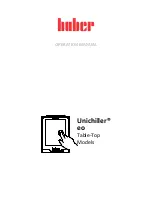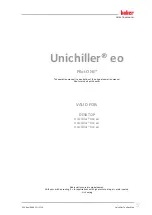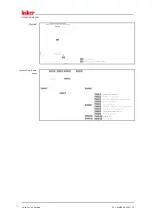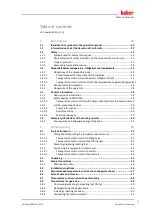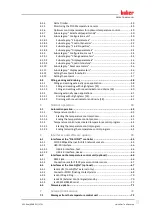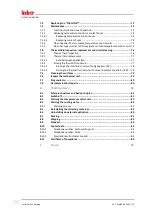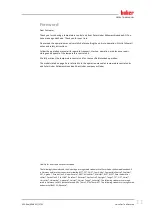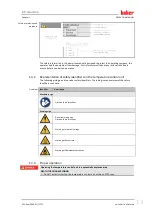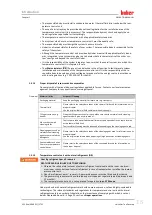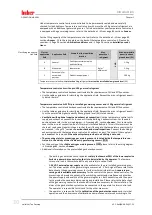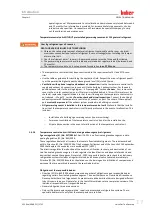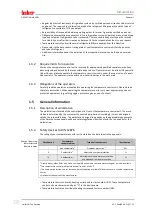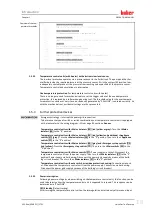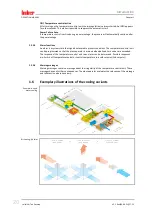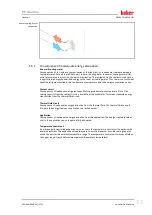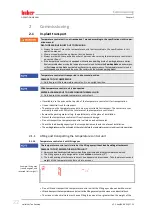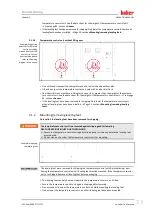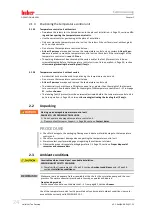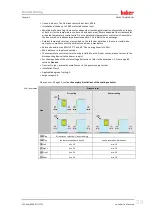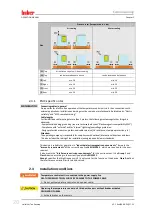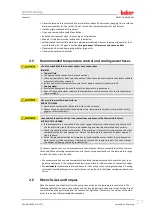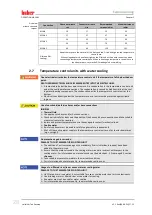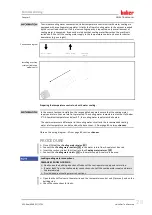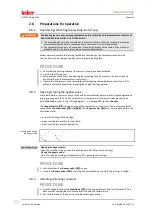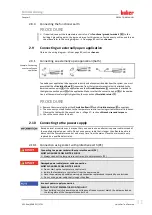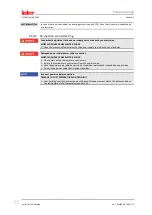
Introduction
Chapter 1
OPERATION MANUAL
V2.2.0en/09.08.21//17.12
Unichiller® eo Desktop
17
operating manual. We recommend to set calibration and maintenance intervals between 6
and 12 months if no information is provided. For increased safety requirements, shorter
intervals can be specified. On request we will recommend a specialist company to carry
out the calibration and maintenance.
Temperature control units WITHOUT pre-installed gas warning sensor and > 150 g natural refrigerant
Over 8 g refrigerant per m³ room air
DEATH OR SERIOUS INJURY DUE TO EXPLOSION
Observe the rating plate (amount of natural refrigerant contained) and the room size (maxi-
mum room concentration of natural refrigerant in case of leakage) when installing the temper-
ature control unit.
Over 8 g refrigerant per m³ room air: A gas warning sensor must be fitted and functioning.
The gas warning sensor must be calibrated and maintained at regular intervals (between 6 and
12 months).
The temperature control unit is not approved for operation
in an ATEX zone
.
▪
The temperature control unit has been constructed to the requirements of EU and EFTA coun-
tries.
▪
Use the table as guidance for classifying the application field. Respect the max. refrigerant quanti-
ty or the permissible highest quantity above ground level (GL) stated therein.
▪
Ventilation with optional supply and exhaust air connection:
Use the temperature control unit’s
supply and exhaust air connection to connect it to the building’s exhaust system. For the exact
position please refer to the wiring diagram.
→
. First, remove the
cover to the air inlet connection; an air filter mat is installed behind it. This air filter mat must be
checked / replaced at regular intervals so that the air flowing into the temperature control unit is
not reduced.
→
»Function check and visual inspection«
. Connect the building’s
exhaust system with the temperature control unit’s exhaust air port. The cover of the supply air
port
mustnot be removed
if the exhaust system provided in a building is not used.
▪
NO gas warning sensor is installed in this temperature control unit!
Make sure that the installa-
tion site of the temperature control unit is sufficiently protected in the event of malfunction. This
includes:
-
Installation of a building’s gas warning sensor (room monitoring).
-
Permanent ventilation of the temperature control unit and/or the installation site.
-
All-pole disconnection in the event of malfunction of the temperature control unit.
1.4.1.3
Temperature control units with fluorinated greenhouse gases/refrigerants
F gases regulation (EC) No. 517/2014
of April 16, 2014, on fluorinated greenhouse gases, and re-
pealing Regulation (EC) No. 842/2006.
These regulations deal with all systems that contain fluorinated refrigerants. The substances dealt
with in Directive (EC) No. 1005/2009 of the European Parliament and of the Council of 16 September
2009 that deplete the ozone layer are excluded (CFC/HCFC).
The directive regulates the reduction of the emission, utilization, recovery, and destruction of cer-
tain fluorinated greenhouse gases. It also regulates the identification and disposal of products and
devices that contain these gases. Since July 4, 2007, responsible bodies must check their stationary
refrigeration systems for leaks at regular intervals, and have any leaks eliminated immediately.
Directive (EC) No. 303/2008 contains stipulations on the training and certification of companies and
personnel that are permitted to execute the specified activities.
Obligations of the responsible bodies:
▪
Directive (EC) No. 842/2006 already imposed a number of obligations upon responsible bodies
regarding certain fluorinated greenhouse gases. The new Ordinance on Fluorinated Greenhouse
Gases upholds these to a large extent. Some duties are added while others are designed different-
ly by this new ordinance. Please refer to the text of this ordinance for a complete overview of the
individual responsibilities of responsible bodies.
▪
General obligation to reduce emissions.
▪
Only certified companies may maintain, repair or decommission refrigeration systems. The re-
sponsible bodies must verify that these companies are certified.

